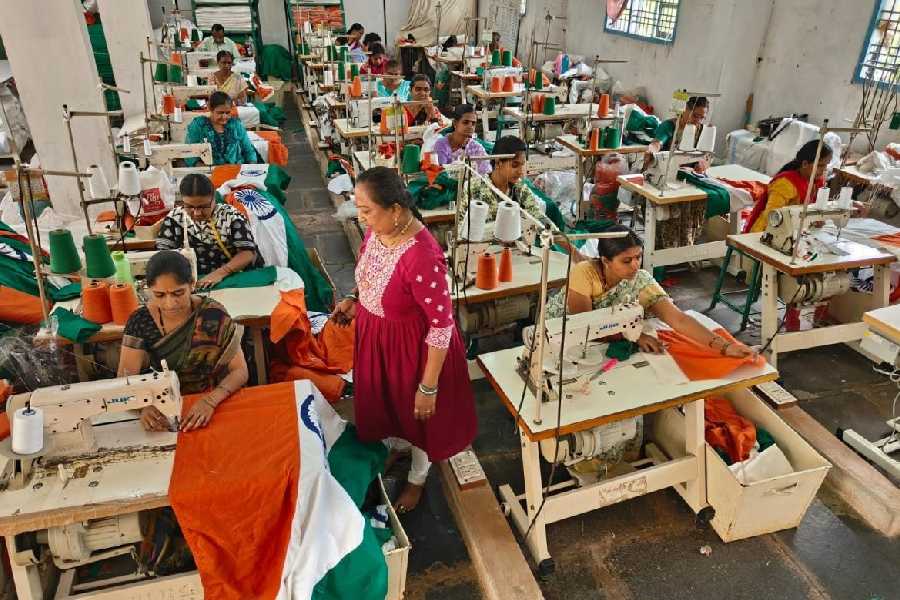The khadi sector has been struggling with dwindling demand for two years after the Centre amended the National Flag Code to allow non-khadi Tricolours.
The Karnataka Khadi Gramodyog Samyukta Sangh (KKGSS), the country’s sole manufacturer of khadi Tricolours with a Bureau of Indian Standards (BIS) certificate, has never faced such a crisis as the national flag it manufactures has always been in high demand until the polyester variants hit the market ahead of Independence Day in 2022.
“It’s been two years of extreme struggle for the khadi sector everywhere and it’s no different in Karnataka. We make national flags according to BIS specifications on the fabric, thread, colour, stitching and dimensions,” KKGSS secretary Shivananda Mathapati told The Telegraph on Wednesday.
The amendment to the flag code allowed Tricolours to be made with machine-made polyester instead of only hand-spun and hand-woven (khadi) cotton, silk and wool.
A day ahead of Independence Day, Mathapati is a worried man as the federation has sold flags worth only ₹1.4 crore, including the ₹60 lakh worth of stock purchased by the Khadi Bhavan in Delhi. “Usually we sell national flags worth at least ₹2 crore, apart from the sale to the Khadi Bhavan in Delhi,” said Mathapati who spearheaded a campaign against the amendments to the flag code.
“These months are usually very busy for the khadi industry since Independence Day is just five months away from Republic Day when flags see a surge in demand. But things have drastically changed as non-khadi flags are sold at throwaway prices on the streets,” he said.
The shrinking demand for khadi flags has impacted the workers’ earnings. “From July 1 to August 14, workers work overtime for at least two hours each day to cope with the demand. But all that is a thing of the past since 2022 as we haven’t had to get a single worker to work overtime,” he said.
Right now 35,000 people, 95 per cent of them women, are engaged in the khadi sector in Karnataka. Around 1,200 of these workers are engaged in making the national flag.
Mathapati said efforts were on to convince the Union and state governments to introduce khadi products in government hospitals and students’ hostels run by the state social welfare department. “We have sufficient capacity to supply bedsheets, curtains, towels and other fabric required for government hospitals. We can supply the same products to hostels run by the state social welfare department. I hope the authorities will listen to us,” he added.
Shankar Halagatti, general secretary of Karnataka Vidya Vardhaka Sangha in Dharwad that promotes Kannada and the state’s culture, suggested khadi uniforms in government departments and educational institutions.
“The government can easily introduce khadi uniforms for Group D employees at least once a week. Government educational institutions can also make it mandatory to wear khadi uniforms one day a week. That alone would boost khadi sales and production,” said Halagatti.










